
Blind Willie Johnson was an American gospel blues singer and guitarist. His landmark recordings completed between 1927 and 1930—thirty songs in total—display a combination of powerful "chest voice" singing, slide guitar skills, and originality that has influenced generations of musicians. Even though Johnson's records sold well, as a street performer and preacher, he had little wealth in his lifetime. His life was poorly documented, but over time, music historians such as Samuel Charters have uncovered more about Johnson and his five recording sessions.

The Blind Boys of Alabama, also billed as The Five Blind Boys of Alabama, and Clarence Fountain and the Blind Boys of Alabama, is an American gospel group. The group was founded in 1939 in Talladega, Alabama, and has featured a changing roster of musicians over its history, the majority of whom are or were vision impaired.
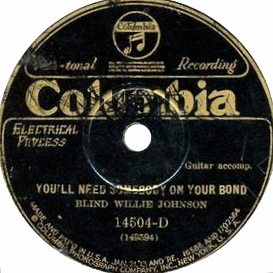
"You'll Need Somebody on Your Bond" is a gospel song that is attributed to both tradition and to gospel blues musician Blind Willie Johnson. Johnson first recorded the song in December 1930, although Delta blues musician Charley Patton recorded a similar "You're Gonna Need Somebody When You Die" in October 1929. Over the years, several other musicians have recorded renditions of the song.

"In My Time of Dying" is a gospel music song by Blind Willie Johnson. The title line, closing each stanza of the song, refers to a deathbed and was inspired by a passage in the Bible from Psalms 41:3 "The Lord will strengthen him upon the bed of languishing, thou wilt make all his bed in his sickness". Numerous artists have recorded variations, including Bob Dylan and Led Zeppelin.

"(The) Soul of a Man" is a gospel blues song recorded by Blind Willie Johnson in 1930. As with most of Johnson's songs, it deals with a spiritual theme within a blues musical framework. Accompanying Johnson is Willis B. Harris, sometimes identified as his first wife, who sang harmony on the refrain:

"It's Nobody's Fault but Mine" or "Nobody's Fault but Mine" is a song first recorded by gospel blues artist Blind Willie Johnson in 1927. It is a solo performance with Johnson singing and playing slide guitar. The song has been interpreted and recorded by numerous musicians in a variety of styles, including Led Zeppelin on their 1976 album Presence.

"Dark Was the Night, Cold Was the Ground" is a gospel blues song written and performed by American musician Blind Willie Johnson and recorded in 1927. The song is primarily an instrumental featuring Johnson's self-taught bottleneck slide guitar and picking style accompanied by his vocalizations of humming and moaning. It has the distinction of being one of 27 samples of music included on the Voyager Golden Record, launched into space in 1977 to represent the diversity of life on Earth. The song has been highly praised and covered by numerous musicians and is featured on the soundtracks of several films.
"Mother's Children Have a Hard Time", also known as "Motherless Children", is a gospel blues song recorded by Blind Willie Johnson in 1927. It is a solo performance, with Johnson singing and playing an acoustic slide guitar.
"Keep Your Lamp(s) Trimmed and Burning" is a traditional gospel blues song. It alludes to the Parable of the Wise and Foolish Virgins, found in the Gospel of Matthew at 25:1-13, and also to a verse in the Gospel of Luke, at 12:35.

"Bye and Bye We're (or, I'm) Going to See the King" is a Christian song from the African-American musical tradition. It is known by a variety of titles, including "I Wouldn't Mind Dying (If Dying Was All)" and "A Mother's Last Word to Her Daughter". It was recorded seven times before 1930, using the preceding titles.
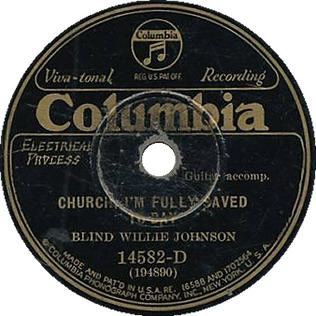
"Church, I'm Fully Saved To-Day" is a gospel blues song recorded by Blind Willie Johnson in 1930, with backing vocals by Willis B. Harris, sometimes identified as his first wife. It was released on Columbia 14582-D, as B-side to "The Soul of a Man". The song is derived from the hymn "Fully Saved Today" by William J. Henry (words) and Clarence E. Hunter (music), published in 1911, and follows a call-and-response format.
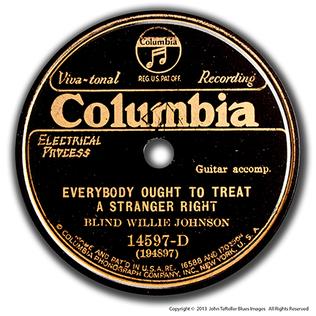
"Everybody Ought to Treat a Stranger Right" is a gospel blues song recorded in 1930 by Blind Willie Johnson with backing vocals by Willis B. Harris, who may have been his first wife. The song was released in 1930 on Columbia 14597 as B-side to "Go with Me to That Land".

"God Don't Never Change" is a gospel blues song recorded by Blind Willie Johnson in 1929. The song is sometimes titled "God Don't Ever Change".
"(I Know) His Blood CanMake Me Whole" is a traditional gospel blues song recorded by Blind Willie Johnson in 1927. It was released on his first single, with the flip side "Jesus Make Up My Dying Bed".

"When the War Was On" is a call and response blues song recorded in 1929 by Blind Willie Johnson and Willis B. Harris, who is thought to have been his first wife. Johnson plays bottleneck guitar, and sings throughout in his "growl" voice; Harris sings soprano.
"Trouble Will Soon Be Over" is a traditional gospel blues song recorded in 1929 by Blind Willie Johnson and Willis B. Harris, who is thought to have been his first wife.
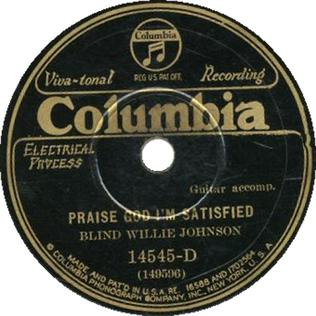
"Praise God I'm Satisfied" is a traditional gospel blues song recorded in 1929 by Blind Willie Johnson and Willis B. Harris (vocals), who is thought to have been his first wife.
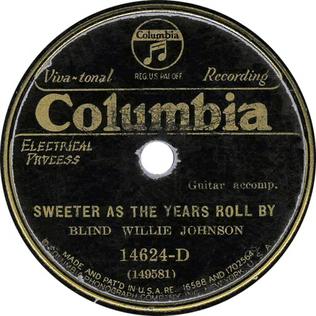
"Sweeter as the Years Go By" is a Christian hymn written by Lelia N. Morris in 1912. It has been included in 87 hymnals. Its subject-matter is expressed in the refrain:

The Complete Blind Willie Johnson is a compilation album of all the known recordings by American gospel blues singer-guitarist Blind Willie Johnson. As part of the Roots N' Blues series, it was released jointly by Columbia Records and Legacy Recordings, on April 27, 1993. All of the tracks on the two-compact disc set were originally issued by Columbia on the then-standard two-sided 78 rpm record format.

American Epic: The Best of Blind Willie Johnson is a compilation album released to accompany the award-winning American Epic documentary film series. It collects performances from Blind Willie Johnson's five recording sessions for Columbia Records in Dallas, Atlanta, and New Orleans between 1927 and 1930. The album was released as a 16-track download and a vinyl LP.
















